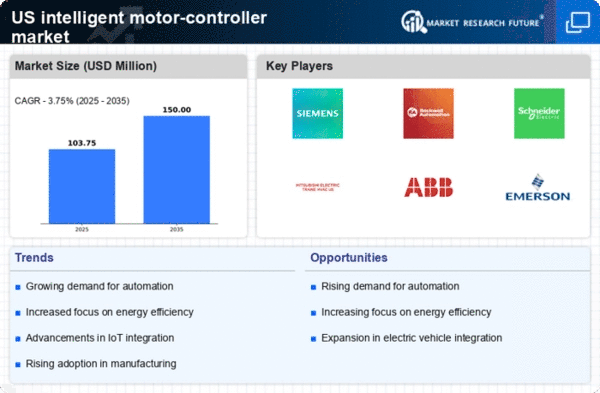Growing Focus on Predictive Maintenance
The intelligent motor-controller market is witnessing a growing focus on predictive maintenance strategies, which are becoming increasingly vital for industries aiming to minimize downtime and maintenance costs. By utilizing intelligent motor controllers equipped with advanced monitoring capabilities, companies can predict potential failures and schedule maintenance proactively. This shift towards predictive maintenance is expected to reduce unplanned outages by up to 30%, significantly enhancing operational efficiency. Industries such as oil and gas, manufacturing, and utilities are particularly benefiting from this trend, as they rely heavily on continuous operations. The market for intelligent motor controllers is projected to expand as organizations recognize the value of integrating these technologies into their maintenance practices, potentially leading to a market growth rate of 12% in the coming years. This trend underscores the importance of reliability and efficiency in modern industrial operations.
Rising Demand for Automation in Manufacturing
The intelligent motor-controller market is experiencing a notable surge in demand driven by the increasing automation in manufacturing processes across various sectors. As industries strive for enhanced productivity and reduced operational costs, the integration of intelligent motor controllers becomes essential. These devices facilitate precise control over motor functions, leading to improved efficiency and reduced downtime. According to recent data, the automation sector is projected to grow at a CAGR of approximately 10% over the next five years, further propelling the adoption of intelligent motor controllers. This trend is particularly evident in automotive and electronics manufacturing, where the need for high-performance and reliable motor control solutions is paramount. Consequently, the intelligent motor-controller market is likely to benefit significantly from this growing emphasis on automation, as manufacturers seek to optimize their operations and maintain competitiveness.
Increased Investment in Renewable Energy Sources
The intelligent motor-controller market is being positively influenced by the increased investment in renewable energy sources, such as wind and solar power. As the U.S. transitions towards more sustainable energy solutions, the demand for efficient motor control systems in renewable energy applications is on the rise. Intelligent motor controllers play a pivotal role in optimizing the performance of renewable energy systems, ensuring that they operate at peak efficiency. Recent reports indicate that investments in renewable energy are expected to reach $500 billion by 2030, creating substantial opportunities for the intelligent motor-controller market. This trend not only supports the growth of the market but also aligns with broader environmental goals, as industries seek to reduce their carbon footprint and enhance energy efficiency. Consequently, the intelligent motor-controller market is likely to see a robust expansion driven by this shift towards sustainable energy.
Technological Advancements in Motor Control Systems
Technological advancements in motor control systems are significantly shaping the intelligent motor-controller market. Innovations such as enhanced algorithms, improved sensor technologies, and advanced communication protocols are enabling more sophisticated motor control solutions. These advancements allow for greater precision, efficiency, and adaptability in various applications, from industrial automation to robotics. The market is projected to grow at a CAGR of approximately 11% over the next five years, driven by the increasing demand for high-performance motor control systems. As industries continue to evolve and embrace digital transformation, the need for intelligent motor controllers that can seamlessly integrate with existing systems becomes paramount. This trend highlights the importance of continuous innovation in the intelligent motor-controller market, as companies strive to meet the ever-changing demands of modern applications.
Government Initiatives Supporting Smart Technologies
Government initiatives aimed at promoting smart technologies are playing a crucial role in the growth of the intelligent motor-controller market. Various federal and state programs are designed to encourage the adoption of advanced manufacturing technologies, including intelligent motor controllers. These initiatives often include financial incentives, grants, and tax breaks for companies investing in smart manufacturing solutions. For instance, the U.S. Department of Energy has launched programs to support energy-efficient technologies, which directly impacts the intelligent motor-controller market. As a result, businesses are increasingly motivated to upgrade their systems, leading to a projected market growth of around 15% over the next few years. This supportive regulatory environment not only fosters innovation but also enhances the overall competitiveness of the manufacturing sector, thereby driving demand for intelligent motor controllers.
















